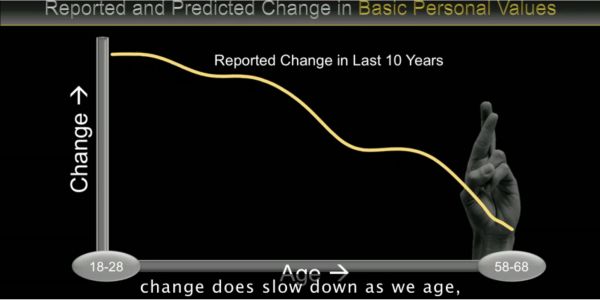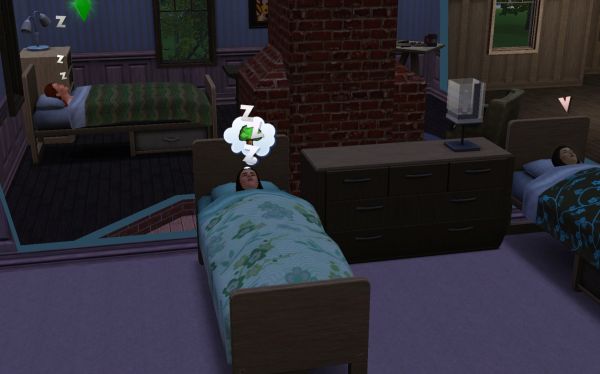
Change slows down as we age. But not for all of us equally. It seems delta sleep keeps us younger for longer, and we can induce delta waves artificially.
A while ago I watched a TED video with Dan Gilbert which centered on the fact that people poorly estimate their future change. (Not pocket change, but change in values, behavior etc.) A study asked a wide range of people either a) how much they had changed over the last 10 years or b) how much they expected to change over the next ten years. Then they matched the answers by age: The 18 year olds thought they would not change much by the age of 28, but the 28 year olds thought they had changed a lot since they were 18, and so on. This is the focus of the story.
But I noticed the shape of the curve they drew. Three curves actually, but they were very similar for a number of ways in which people change over the course of their life. The change is rapid at first, and declines gradually but with some noticeable steps, then declining greatly in old age. The curve is familiar, but it took me some hours to recognize it, because I had not seen it before, just seen it described in text form. Oh, and I had described it myself too. I often answer basic questions about sleep on Quora, and one of the things I explained was the function of “delta sleep”.
Called NREM stage 3 these days, this deepest sleep is less formally called “slow-wave sleep”, because the brainwaves that dominate the whole brain in this sleep stage are large and slow. The slow, regular brainwaves are called “delta waves” and technically waves below 4 Hz fall in this category. The dominant waves during slow-wave sleep however are usually 1 Hz or less, in other words less than one complete wave per second! They can go as far as 1/3 Hz, where one wave takes 3 seconds.
Despite the slowness of the delta brain waves, the brain is actually doing various useful things. One of them is related to learning. A study shows that people who have been training to learn a 3D maze during the day have increased blood flow in the same brain area during slow-wave sleep, compared to a control group that did not undergo intensive training. Another important thing that happens during this deep sleep phase is the release of Human Growth Hormone. In children this hormone triggers growth, as the name implies, but in adults it triggers regeneration. Basically it keeps us young and healthy.
We know that delta sleep is important, because bad things happen to test animals who are kept away from it. Their learning is impaired, but worse, their immune system is also weakened, and they lose the ability to deal with stress. Eventually they die early. Luckily the body goes very far to recover this type of sleep. If you stay awake for days, the body first recovers delta sleep and also REM sleep, the vivid dream sleep that seems important for memory and sanity. If you become chronically sleep deprived, the body will start running short periods of slow-wave sleep, so-called “microsleep”, while you are awake. Thoughtfully this is done when there seems to be downtime, when nothing particularly challenging is going on. Like at school, at office … or on a long stretch of road. Suddenly 10 seconds are missing from your life. If those seconds should have included some adjustment to the car’s trajectory, they may be the last 10 seconds of your life. So don’t go around missing delta sleep.
***
In babies, delta waves take up much of their sleeping time and some of their waking time. The waking delta fades later in childhood. Delta sleep remains fairly high in teenagers, and may appear in all the sleep cycles. (The first sleep cycle is from falling asleep to the end of the first REM sleep. The later cycles are from the end of one REM period to the end of the next. Each sleep cycle features first a slowing of the brain waves, and later the waves become faster again, until REM – vivid dream sleep – where brainwaves are as fast and irregular as during excited waking activities.) In children and teenagers, the deep delta sleep can occur in all sleep cycles, but is longer in the first cycles. In adults, delta sleep only occurs during the first sleep cycles, and is markedly longer during the first of them. Delta sleep continues to shrink during life, and in the elderly it can cease entirely, especially in men, or occur only some nights and not others.
There is a remarkable parallel between the decline of delta sleep and the complex process we call aging. But is one the cause of the other? Or is there some underlying process that causes them both? This is a very good question. If delta waves keep us young, we could stay young longer by increasing the amount of time our brain spends in delta sleep, or perhaps even in delta waves during waking time, which is rare but possible.
As it happens, there is a drug that can induce delta sleep. It seems to have no serious side effects when used clinically. Apart from the usual conservatism of the medical establishment, there is one big reason why it is not more widespread: It is the best date rape drug on the market. You are not going to get this drug on prescription or walk out of the lab with it in your pocket. All legal sources of the drug are strictly controlled. And as long as humans are the way they are, this is not likely to change, unfortunately. So we won’t know whether people who take this drug regularly live longer and healthier lives, as they would if delta sleep was the “fountain of youth” that some suspect.
And here our story could have ended. But there is another, more cumbersome way to induce delta waves – or any frequency of brain waves that can occur naturally – and I have mentioned it repeatedly over the last few years. It is called brainwave entrainment.
***
Brainwave entrainment means that we use an outside impulse to synchronize brainwaves to a particular frequency. Sound, light and even touch can be used for this, but sound is by far the most common, cheap and convenient. There are several different sound effects that can be used as well. In the beginning, binaural beats were most popular. This is the coolest of the bunch, as you send sound to each ear with a slightly different frequency. The brain starts to resonate to the difference between the frequencies. So you could play back a speech or a piece of music but having altered the frequency slight on one ear, and simply listening to this would gradually induce the specific frequency of brain waves.
Other systems such as monaural beats and isochronic tones exist, and isochronic tones are actually considered the most effective, but they tend to be clearly audible unless masked with other more complex sounds. If you buy pre-packaged sound tracks you will normally find that they have some kind of soundscape like rainfall or other nature sounds that take the edge off the repetitive sounds that trigger the actual entrainment.
At first it takes up to 8 minutes to entrain the brain so that most of the brainwaves resonate to the same frequency across almost the whole brain. With practice this time can be lowered significantly, so that one slips into a familiar frequency more easily.
Brainwave entrainment can happen during sleep or while awake. Because delta waves only occur naturally during sleep, there is a tendency at first to fall asleep when these are induced while you are awake. With practice you become better at staying awake, but that may not necessarily be what you want. Certainly if you use brainwave entrainment as an aid in meditation, then you should practice while you are rested and train yourself to remain awake. But if you want the deep sleep effect, you would want to put on the delta soundtrack when you are going to sleep or taking a nap. If you suffer from insomnia, brainwave entrainment is awesome: If you fall asleep, good. If you stay awake, you still get the deep restful brainwaves.
I should caution here that from my own experience and that of my friends, some trippy and unpleasant side effects can appear if you start doing deep brainwave entrainment suddenly without gradually building up to it with shorter periods and less deep frequencies. Migraines, double vision, nightmares and temporary loss of short-term memory can appear during or after use, although this does not happen to all and is always temporary. For this reason I recommend starting with alpha wave entrainment, which induces waves you normally have during relaxation and when falling asleep. The brain is used to having these experiences, so side effects are likely to be harmless and often pleasant: A feeling of weightlessness, seeing lights while your eyes are closed, sudden bursts of memories or emotions, or sometimes a feeling of “energy” running along your body. But most of the time nothing, or just a sense of peace and relaxation.
With some months of practice, you should be able to use delta wave entrainment with no side effects, like I do. I did not actually get into this for reasons of longevity, and certainly not to change. It was pretty much scientific curiosity that made me try out Holosync, and later Lifeflow, and eventually making my own tracks using Gnaural, a public domain software that is not very intuitive to use but totally free and fairly flexible. After satisfying my curiosity, I continued because it helped with a completely different problem for me: Delayed Sleep Phase Syndrome, a situation where the patient does not become sleepy until the morning, and has a hard time staying awake early in the workday. By using delta brainwave entrainment I could go to bed earlier, and if I did not fall asleep I would still get a decent degree of rest from meditating with the entrainment. Ironically, knowing that you don’t need to fall asleep is the best cure for insomnia.
I remember mentioning around New Years (after I started with delta wave entrainment in spring), that I had changed so much that year. But I was not sure whether it was because of the brainwave entrainment, or the “Happy Science” books by Ryuho Okawa, or the mostly Christian spiritual literature recommended on the One Cosmos blog. All of these things kind of heaped up in that year. But would the books have made the same impression on me if I had less delta waves in my life? I don’t know. I am just a single person (literally so) and there is just too much outside influences for my personal experience to prove or disprove anything. (As skeptics say: The plural of anecdote is not data.) In order to know more, we need many more people to try this course of action.
The way I see it, there is very little to lose. If you have the patience to start easy, there should be no unpleasant side effects, and it is in any case totally harmless. On the other hand there are the benefits of better learning, better health, and a subjective experience of having more time (because time does not just fly by without you learning from it). It may not be a magic pill, but it is close enough that I recommend it. Unless you think change could only be for the worse – after all, perhaps you are already close enough to perfect. ^_^








